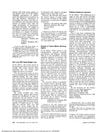 January 2023 in “Applied sciences”
January 2023 in “Applied sciences” Gefitinib and Sasam-Kyeongokgo together significantly reduce cancer growth and improve immune response in mice.
 5 citations,
September 2017 in “Journal of Cosmetic Dermatology”
5 citations,
September 2017 in “Journal of Cosmetic Dermatology” A marine protein-based dietary supplement can safely boost hair growth and reduce hair loss in people with thinning hair.
27 citations,
January 2015 in “International Journal of Trichology” The supplement helps improve hair growth and reduce hair shedding.
26 citations,
June 2003 in “PubMed” Alpha-difluoromethylornithine prevents cancer in mice but causes hair loss.
 22 citations,
January 2014 in “Biological & Pharmaceutical Bulletin”
22 citations,
January 2014 in “Biological & Pharmaceutical Bulletin” Ginsenoside F2 may help prevent hair loss and promote hair growth better than finasteride.
 2 citations,
April 2017 in “Molecular Medicine Reports”
2 citations,
April 2017 in “Molecular Medicine Reports” Blocking autophagy increases survival of inner ear hair cells exposed to gentamicin.
 6 citations,
December 2022 in “Cell reports”
6 citations,
December 2022 in “Cell reports” Eating a high-fat fish oil diet caused mice to lose hair due to a specific immune cell activity in the skin linked to a protein called E-FABP.
 3 citations,
April 2021 in “Biomolecules & Therapeutics”
3 citations,
April 2021 in “Biomolecules & Therapeutics” The protein ER71/ETV2 helps regrow hair after chemotherapy by improving the growth of new blood vessels.
 April 2024 in “bioRxiv (Cold Spring Harbor Laboratory)”
April 2024 in “bioRxiv (Cold Spring Harbor Laboratory)” GRK2 is essential for healthy hair follicle function, and its absence can lead to hair loss and cysts.
 65 citations,
September 2004 in “The American journal of pathology”
65 citations,
September 2004 in “The American journal of pathology” Blocking BMP signaling causes hair loss and disrupts hair growth cycles.
 5 citations,
February 1977 in “Archives of Dermatology”
5 citations,
February 1977 in “Archives of Dermatology” Eating more protein during fast weight loss can prevent hair loss.
September 2017 in “Springer eBooks” Certain supplements, like whey protein isolate and growth hormones, can worsen hair loss.
 4 citations,
August 2018 in “Facial Plastic Surgery Clinics of North America”
4 citations,
August 2018 in “Facial Plastic Surgery Clinics of North America” Platelet-Rich Plasma (PRP), a protein-rich extract from a patient's blood, shows promise in improving hair density, thickness, and quality, but the best method of use and number of treatments needed for noticeable results are still unclear.
 May 2024 in “JCI insight”
May 2024 in “JCI insight” A variant in the ADAM17 gene causes hair loss by increasing protein degradation through TRIM47.
 68 citations,
May 2018 in “PLOS Biology”
68 citations,
May 2018 in “PLOS Biology” Cyclosporine A may help treat hair loss by blocking a protein that inhibits hair growth.
 47 citations,
May 1995 in “Journal of Investigative Dermatology”
47 citations,
May 1995 in “Journal of Investigative Dermatology” Hair follicles in people with alopecia have lower levels of a key blood vessel growth protein.
8 citations,
December 2015 in “JAMA ophthalmology” A young man had vision loss, hair loss, and other symptoms, but tests showed mostly normal results except for slightly high protein in spinal fluid.
 1 citations,
April 2020 in “bioRxiv (Cold Spring Harbor Laboratory)”
1 citations,
April 2020 in “bioRxiv (Cold Spring Harbor Laboratory)” Polyamines are important in deciding hair follicle stem cell behavior, affecting hair growth and loss.
January 2023 in “International journal of research publications” Rice bran oil works as well as 2% minoxidil to prevent hair loss and promote hair growth.
 February 2022 in “Journal of Cosmetic Dermatology”
February 2022 in “Journal of Cosmetic Dermatology” Women with pattern hair loss may have more stress in their bodies due to a lack of NRF2, a protein. Eating healthy and losing weight could help reduce this stress and improve hair loss. NRF2 boosters might also help treat this type of hair loss.
 September 2016 in “Springer eBooks”
September 2016 in “Springer eBooks” Fat-derived stem cells may help treat skin aging and hair loss.
 January 2015 in “Springer eBooks”
January 2015 in “Springer eBooks” Fat-derived stem cells and their secretions show promise for treating skin aging and hair loss.
 75 citations,
August 2008 in “PLOS ONE”
75 citations,
August 2008 in “PLOS ONE” Wnt3a protein, when packed in liposomal vesicles, can stimulate hair growth and could potentially treat conditions like hair loss.
 20 citations,
November 2019 in “Stem Cells”
20 citations,
November 2019 in “Stem Cells” Hes1 protein is important for hair growth and regeneration, and could be a potential treatment for hair loss.
18 citations,
January 1994 in “Skin pharmacology and physiology” Sunlight damages hair, causing cuticle loss, protein changes, and discoloration.
 11 citations,
December 2014 in “The American journal of pathology”
11 citations,
December 2014 in “The American journal of pathology” A gene deletion in mice causes weak protein, immune issues, hair loss, airway problems, and wasting disease.
 7 citations,
February 2016 in “Dermatology and therapy”
7 citations,
February 2016 in “Dermatology and therapy” t-Flavanone helps improve male pattern hair loss by making hair roots stronger.
 1 citations,
January 2024 in “Journal of the American Academy of Dermatology”
1 citations,
January 2024 in “Journal of the American Academy of Dermatology” COVID-19 vaccines have been linked to an increase in hair loss conditions.
 July 2024 in “bioRxiv (Cold Spring Harbor Laboratory)”
July 2024 in “bioRxiv (Cold Spring Harbor Laboratory)” Hair loss in certain mice is linked to changes in keratin-related genes.
 January 2017 in “Jikken doubutsu ihou/Jikken doubutsu/Experimental animals/Jikken Dobutsu”
January 2017 in “Jikken doubutsu ihou/Jikken doubutsu/Experimental animals/Jikken Dobutsu” Mice with a changed Hr gene lose and regrow hair due to changes in the gene's activity.
























